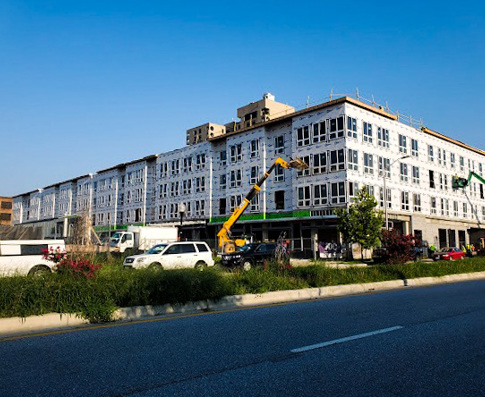Community Benefits TIF Advances for Perkins Somerset Oldtown Transformation Plan
BALTIMORE, MD – Today, the Baltimore City Planning Commission unanimously approved the Tax Increment Financing (TIF) legislation for the Perkins Somerset Oldtown (PSO) Transformation area. The legislation designates the PSO Development District (City Council Bill 20-587), creates the authority to issue bonds (City Council Bill 20-588), and creates the PSO Special Taxing District (City Council Bill 20-589), which earmarks automatically generated tax revenue from the new development to pay for the bonds that will finance the project.

The PSO Transformation area is a 244-acre site that includes Perkins Homes, the former Somerset Homes site, and the Oldtown Mall. The City’s first Community Benefits TIF will provide funding to create a new mixed-income community that includes 652 replacement units at Perkins and Somerset Homes along with an additional 590 affordable housing units spread throughout Perkins Somerset and Oldtown.
“The PSO Transformation Plan is creating livable and productive communities that promote resident pride,” said Janet Abrahams, President and CEO, Housing Authority of Baltimore City (HABC). “We are redesigning and revamping Baltimore’s aging public housing stock that will yield benefits for existing and future residents and the surrounding neighborhoods. The PSO is a collaborative effort by government agencies, community stakeholders, developers and residents – all working together to reverse decades of disinvestment and intergenerational poverty.”
The PSO TIF will generate new opportunities for Baltimore residents. The new housing will be near local businesses and health services, including a planned new grocery store, a new City Springs Elementary and Middle School, two new parks, and a revitalized Oldtown Mall that is anticipated to include a hotel and office and retail space. Revitalization in the area will create more than 3,000 jobs during construction, and close to 1,000 permanent jobs will be generated from the hotel, office, and retail components of the project. The entire PSO Transformation Plan will yield nearly $1 billion in investment in the area when completed.
“The PSO Transformation Plan represents a major milestone for Baltimore concerning comprehensive neighborhood transformation,” said Acting Baltimore City Housing Commissioner Alice Kennedy. “Through this work, Baltimore can distinguish itself as a model city for improving living conditions and creating mixed-income communities that reduce concentrated poverty and ensure that the City’s public housing residents have access to quality schools, jobs, retail, and services. Redevelopment is not coming at the expense of lower-income residents, but with specific attention to public housing and affordable housing needs.”
The PSO Transformation Plan is funded in part with a $30 million HUD CHOICE Neighborhoods Implementation Grant. HABC and the City of Baltimore won this highly competitive grant in 2018, which leverages significant public and private dollars to support locally driven strategies that address struggling neighborhoods with distressed public or HUD-assisted housing. Under the terms of the grant, HABC and the City are obligated to replace existing public housing at Perkins Homes on a one-for-one basis within the PSO footprint. The PSO Transformation Plan not only assures no net loss of public housing units but increases those units and provides more affordable housing opportunities in the city.
The PSO Community Benefits TIF will next be heard by the City Council’s Taxation, Finance and Economic Development Committee on Thursday, September 24, at 10 a.m.
###
About HABC: HABC is the fifth largest public housing authority in the U.S., providing quality affordable housing for more than 23,000 households. The agency creates diverse and vibrant communities, provides opportunities for self-sufficiency, and builds pathways for strong partnerships.
About DHCD: DHCD leads City efforts to promote thriving neighborhoods through community revitalization investments, supporting homeowners, funding critical programs and neighborhood stakeholders, creating and preserving affordable housing, and ensuring safe conditions through code enforcement.
